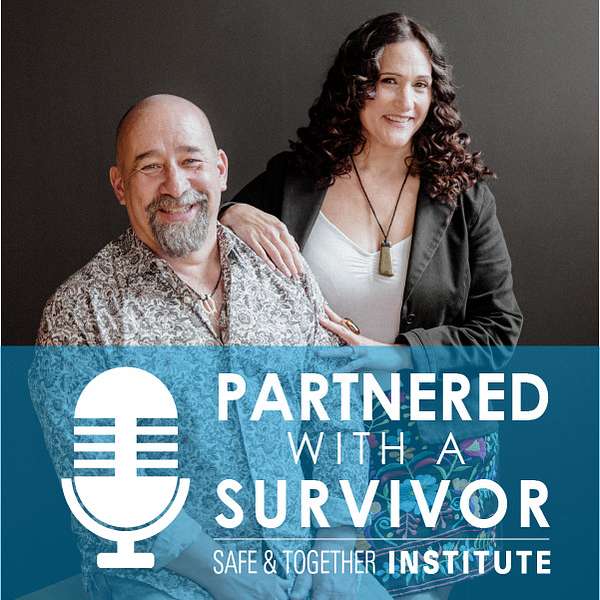
Partnered with a Survivor: David Mandel and Ruth Reymundo Mandel
These podcasts are a reflection of Ruth & David’s ongoing conversations, which are both intimate and professional and touch on complex topics like how systems fail victims and children, how victims experience those systems, and how children are impacted by those failures. Their discussions delve into how society views masculinity and violence and how intersectionalities such as cultural beliefs, religious beliefs and unique vulnerabilities impact how we respond to abuse and violence. These far-ranging discussions offer an insider look into how we navigate the world as professionals, as parents and as partners. During these podcasts, David & Ruth challenge the notions that keep all of us from moving forward collectively as systems, as cultures and as families into safety, nurturance and healing. Note: Some of the topics discussed in the episodes are deeply personal and sensitive, which may be difficult for some people. We occasionally use mature language. We often use gender pronouns like “he” when discussing perpetrators and “she” for victims. While both men and women can be abusive and controlling, and domestic abuse happens in straight and same-sex relationships, the most common situation when it comes to coercive control is a male perpetrator and a female victim. Men's abuse toward women is more closely associated with physical injury, fear and control. Similarly, very different expectations of men and women as parents and the focus of Safe & Together on children in the context of domestic abuse make it impossible to make generic references to gender when it comes to parenting. The Model, through its behavioral focus on patterns of behavior, is useful in identifying and responding to abuse in all situations, including same-sex couples and women's use of violence. We think our listeners are sophisticated enough to understand these distinctions.
Have an idea for a podcast? Tell about it here: https://share.hsforms.com/1l329DGB1TH6AFndCFfB7aA3a1w1
Partnered with a Survivor: David Mandel and Ruth Reymundo Mandel
Season 4 Episode 7: Survivors Are Better Parents Than Most People Think (even survivors themselves)
In this episode, David & Ruth talk about why the Safe & Together Institute focuses on survivor protective capacities and some of the research behind this approach. While assessments of harm and risk, and trauma frameworks are important, these approaches highlight danger and pathologies. But these approaches, while necessary, are not sufficient enough for true collaboration and partnering with survivors. In a world where there are gender double standards related to parenting, e.g. higher standards for women as parents than for men, it is essential that we don’t just focus on harms but also on survivors’ protective efforts and acts of resistance and parenting skills even in environments where the perpetrator is controlling so much. Assessment, and documentation of survivors’ protective capacities can make the difference between whether those children stay safely with that survivor, removed by child protection or placed with an abusive parent.
David and Ruth discuss some of the research behind this strength-based approach to survivors as parents like:
- The growing body of evidence to suggest many domestic violence survivors are good parents who actively take steps to promote their child’s safety and well-being.
- Multiple studies find that mothers who are domestic violence survivors are functioning similarly or even better as parents than their counterparts who are not being abused.
- Greater stress and negative effects of violence on the adult survivor does not always equal compromised parenting.
- A majority of domestic violence survivors, even those experiencing severe violence, do not experience depression or anxiety.
- Most domestic violence survivors do not use drugs nor abuse alcohol to the point of drunkenness.\
- Despite barriers created by the perpetrator, many domestic violence survivors engage in a range of actions to promote the well-being and safety of their children including medical care, employment, and housing.
- Maternal warmth or “mothering resilience” may play a critical protective role for children exposed to perpetrator behavior.
David & Ruth will also talk about how assessing, validating and documenting survivors’ strengths can play an important role in Partnering with Survivors. When professionals assess, validate and document survivors’ protective capacities:
- The validation can combat the perpetrator's mental and psychological control– “you are not a bad mom but a good mom operating in a difficult situation”
- It can help systems and practitioners partner with survivors, e.g. identify st
Now available! Mapping the Perpetrator’s Pattern: A Practitioner’s Tool for Improving Assessment, Intervention, and Outcomes The web-based Perpetrator Pattern Mapping Tool is a virtual practice tool for improving assessment, intervention, and outcomes through a perpetrator pattern-based approach. The tool allows practitioners to apply the Model’s critical concepts and principles to their current case load in real
Check out David Mandel's new book "Stop Blaming Mothers and Ignoring Fathers: How to transform the way we keep children safe from domestic violence."
Visit the Safe & Together Institute website
Start taking Safe & Together Institute courses
Check out Safe & Together Institute upcoming events